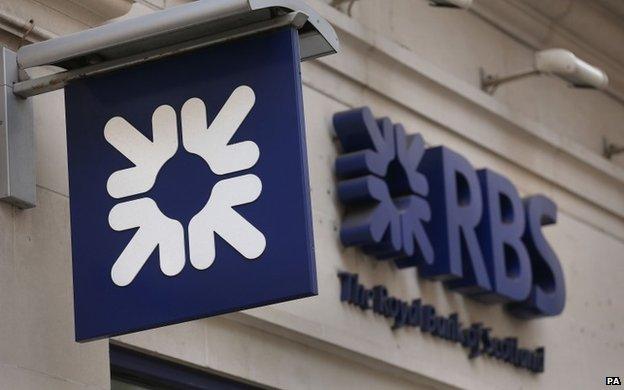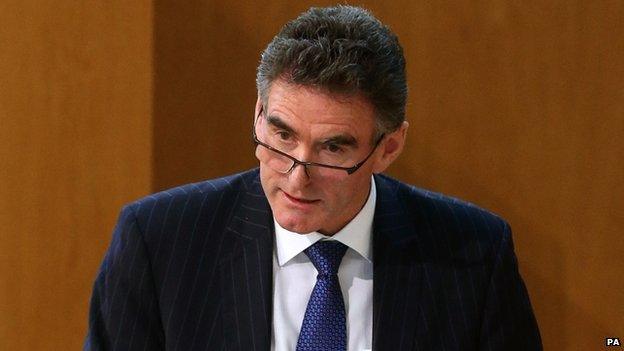Scottish independence: RBS concerns over Scots independence
- Published

The comments from RBS came ahead of the 18 September independence referendum
Royal Bank of Scotland has reiterated that Scottish independence could have a "material adverse effect" on its business.
The Edinburgh-based bank, 80% owned by the taxpayer, said a "Yes" vote in the 18 September referendum could cause uncertainty and hit credit ratings.
RBS said independence could also affect the fiscal and monetary backdrop under which the bank operates.
Scottish ministers said independence would boost the nation's economy.
The bank's comments came it announced its half year results, confirming figures published last week which showed a big jump in operating profits, to £2.6bn.
In a section of its results report on risk factors facing the group, RBS stated: "Although the outcome of the referendum is uncertain, subject to any mitigating factors, uncertainties resulting from an affirmative vote in favour of independence would be likely to significantly impact the group's credit ratings and could also impact the fiscal, monetary, legal and regulatory landscape to which the group is subject.
"Were Scotland to become independent, it may also affect Scotland's status in the EU.
"The occurrence of any of the impacts above could significantly impact the group's costs and would have a material adverse effect on the group's business, financial condition, results of operations and prospects."
'Political events'
The results report added: "The group's credit ratings would be likely to be negatively impacted by political events, such as an affirmative vote in favour of Scottish independence."
The bank earlier raised issues about independence in its annual report, published in April.
Despite this, RBS boss Ross McEwan has previously said the bank could "adapt" its business in the event of independence.
The Scottish government has stressed that an independent Scotland retaining the pound under a formal currency union with the rest of the UK was in everyone's best interests.
And it has said an independent Scotland's membership of the EU would be negotiated "from within", given the UK was already a member, and that a plan to negotiate membership in 18 months was achievable.

RBS chief executive Ross McEwan has said the bank could "adapt" to Scottish independence
A Scottish government spokesperson said a recent survey by finance firm Deloitte highlighted that businesses were more concerned about the impact of the next UK election and a referendum on leaving the EU than Scottish independence.
The spokesperson added: "As Ross McEwan himself pointed out earlier this year, RBS already operates in 38 countries around the world, and if it needed to be 39 then he said 'that's what we'll do'.
"Scotland has a strong and diverse economy and the point of independence is to win the powers we need to build on those strengths and create a more prosperous and secure economy - which is good for the financial sector and everyone else."
Shadow business minister and Scottish Labour MP Ian Murray, said: "That the Royal Bank of Scotland have reiterated their concerns about separation underlines the threat it poses to Scottish jobs, savings and mortgages.
"Alex Salmond cannot continue to ignore these concerns. He is risking the livelihoods of hundreds of thousands of people all across Scotland to fulfil his own political ambitions.
"It is clear that, if we leave the UK, we lose the pound and would have to reapply to join the EU."
The pro-independence think tank Options For Scotland has argued RBS should be broken up in the event of independence, with the Scottish government taking a majority stake in its Scottish arm.
In May, Lloyds Banking Group chairman Lord Blackwell said the referendum was creating "uncertainty" in the sector, although he added the group had not been making plans to leave Scotland in the event of a "Yes" vote.
His comments came after Standard Life, which has had its headquarters in Scotland for 189 years, said it would consider moving parts of it business elsewhere in the event of independence.